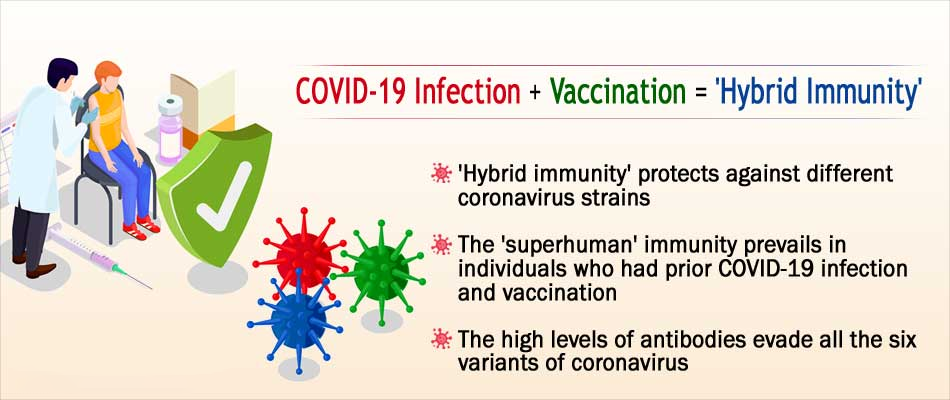Important Facts For Prelims
Hybrid Immunity
- 20 Jan 2023
- 5 min read
Why in News?
A recent study in the journal The Lancet Infectious Diseases held that “hybrid immunity” provides better protection against severe Covid-19, while all immunity against a re-infection wane within a few months.
- The study is based on a meta-analysis of 11 other studies on the protective effectiveness of previous SARS-CoV-2 (Covid) infection and 15 studies on the protective effectiveness of hybrid immunity.
What is Hybrid Immunity?
- Hybrid immunity from an infection is a combination of natural protection along with the immunity provided by the vaccine.
- It appears to result in stronger protection than just infection or vaccination alone.
- In the case of Covid-19, hybrid immunity is when someone recovers from a Covid infection before getting vaccinated.
What are the Highlights of the Study?
- Better Protection:
- A hybrid immunity offers a “higher magnitude and durability” of protection as compared to infection alone, emphasizing the need for vaccination.
- However, with the faster-spreading omicron variants leading to more infections and consequently more people developing this hybrid immunity.
- Efficacy of Hybrid Immunity:
- Protection against severe disease and hospitalisations from a Sars-CoV-2 infection alone was found to be 82.5% at three months after the last shot or infection.
- This protection stood at 74.6% at 12 months and 71.6% at 15 months.
- Protection against reinfection declined faster, standing at 65.2% at three months and dropping to 24.7% at 12 months and 15.5% at 15 months.
- In comparison, hybrid immunity with just the primary vaccine doses was found to be 96% at three months and 97.4% at 12 months.
- The same can offer 69% protection against reinfection at three months, dropping to 41.8% at 12 months.
- The effectiveness of hybrid immunity gained from infection coupled with the primary as well as a booster dose stood at 97.2% at three months and 95.3% at six months.
- Protection against severe disease and hospitalisations from a Sars-CoV-2 infection alone was found to be 82.5% at three months after the last shot or infection.
- Implications:
- It can be used to tailor guidance on the number and timing of SARS-CoV-2 vaccinations.
- It said that in regions with high Sars-CoV-2 sero-prevalence, the primary vaccination – focused mainly on those at the highest risk of severe disease such as the old or co-morbid – can offer high protection against severe disease and hospitalisation for at least one year.
UPSC Civil Services Examination, Previous Years Question (PYQ)
Q. In the context of vaccines manufactured to prevent COVID-19 pandemic, consider the following statements: (2022)
- The Serum Institute of India produced COVID-19 vaccine named Covishield using mRNA platform.
- Sputnik V vaccine is manufactured using vector-based platform.
- COVAXIN is an inactivated pathogen-based vaccine.
Which of the statements given above are correct?
(a) 1 and 2 only
(b) 2 and 3 only
(c) 1 and 3 only
(d) 1, 2 and 3
Ans: (b)
Exp:
- COVISHIELD vaccine is based on the platform which uses a recombinant, replication-deficient chimpanzee adenovirus vector encoding the SARS-CoV-2 Spike (S) glycoprotein. Following administration, the genetic material of part of coronavirus is expressed which stimulates an immune response. Hence, statement 1 is not correct.
- Sputnik V is the world's first registered vaccine based on a well-studied human adenovirus vector platform. It has been approved for use in 71 countries with a total population of 4 billion people. The vaccine is named after the first Soviet space satellite. The vaccine’s efficacy is 97.6%, based on the analysis of data on the incidence of coronavirus among Russians vaccinated with both vaccine components between December 5, 2020 and March 31, 2021. Hence, statement 2 is correct.
- Covaxin is an inactivated viral vaccine. This vaccine is developed with Whole-Virion Inactivated Vero Cell-derived technology. They contain inactivated viruses, which cannot infect a person but still can teach the immune system to prepare a defence mechanism against the active virus. Hence, statement 3 is correct.
- Hence, option (b) is correct.







